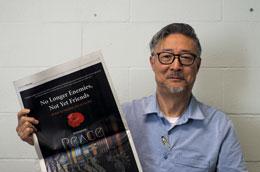In search of yesterday’s foes, today’s neighbours

Much of Canada’s immigration history is shaped by war in faraway lands.
Yesterday’s enemies have become today’s neighbours in Canada, as the country’s immigration policies evolved from favouring an exodus from one side of a conflict over the other, to becoming more inclusive and diverse.
While this has led to a more open and multicultural immigration system, it has also afforded an opportunity to learn how past enmity can prevent future wars.
For D.I. Lee, a Korean-Canadian filmmaker and newspaper publisher, “enemy soldiers from a war zone talking about their new home in Canada” is a long-held vision that is now getting traction to be turned into a documentary series.
“These short documentaries are not only about learning by walking in each other’s shoes…more importantly it about learning from finding out where those shoes have been,” Lee said.
“This documentary aims to show how ordinary folks, once enemies in the past, are living in harmony under the umbrella of Canadian multiculturalism,” he said.
With a working title called “No Longer Enemies, Not Yet Friends”, Lee’s film has the backing of Telefilm Canada and the Korea Communications Agency.
His first foray into the subject will be interviewing participants in the Korean War, which ended 70 years ago with a ceasefire.
The three-year brutal struggle left millions of North and South Koreans dead, and over 100,000 casualties for the United Nations forces involved. More than 26,000 Canadians served on land, at sea and in the air during this bitter conflict that raged in from 1950 to 1953.
China intervened on North Korea’s side during the 1950-53 Korean War. An estimated three million Communist Chinese troops fought alongside Pyongyang’s forces and helped tip the balance of the conflict for the North.
Western estimates commonly cite a figure of 400,000 Chinese deaths. Beijing’s intervention ended the hostilities, but an impasse persists to this day.
One of the most brutal episodes in the Korean war was the Battle of Kapyong, where 10 Canadians were killed and 23 were wounded. They were among the 516 Canadians who died in service during the Korean War.
The Battle of Kapyong took place from April 22 to 25, 1951 and was one of the first battles in which Canadians participated during the Korean War, according to Canadian government archives.
For two days a battalion of roughly 700 Canadian troops (the 2nd Battalion of the Princess Patricia’s Canadian Light Infantry Regiment) helped defend a crucial hill in the front lines of the Korean War against a force of about 5,000 Chinese soldiers. Besieged by waves of attackers, the Canadians held their position amid the horror of close combat until the assaulting force had been halted and the Canadians could be relieved, according to the Canadian Encyclopaedia.
The battle was a turning point in the Korean War. The 2nd Battalion was awarded the United States Presidential Unit Citation – a very rare honour for a Canadian unit.
Lee has connected with soldiers and officers from the various participating armies but finding a Chinese soldier who was at Kapyong or who was enlisted by the Chinese to fight on behalf of North Korea remains elusive.
“This is a component I am missing…most of the surviving soldiers are in the 90’s…I have contacted some families and I am hoping there is someone out there who can speak to their involvement in the war,” he said.
Lee said the ultimate objective of the documentary series is to show what drove the opposite sides to hate and wage war.
“This can address some deep rooted but often questionable cultural characterizations which have been at the root of many hate crimes we are seeing today in Canada and the US.
“We can learn from the past conflicts and today’s neighbors to create a better future for all in Canada,” he said.
After the segment featuring soldiers from the Korean War, Lee hopes to tell the stories of the warring sides from conflicts in Africa, South America and Europe who have now come to call Canada their home.
If you know interested parties who want to share their experiences in these documentary series, especially the ongoing segment featuring the Korean war, please contact Di Lee at dilee@hankookin.ca









